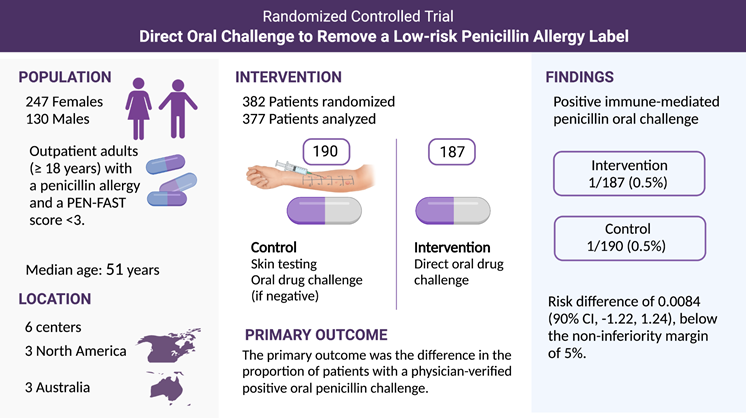World-first clinical trial to help millions of Australians with penicillin allergies
- Published
- Tuesday, July 18, 2023 - 1:00 AM
 A world-first randomised control trial, the Penicillin Allergy Clinical Decision Rule (PALACE) study, has revealed promising results in the field of penicillin allergy testing.
A world-first randomised control trial, the Penicillin Allergy Clinical Decision Rule (PALACE) study, has revealed promising results in the field of penicillin allergy testing.
Professor Jason Trubiano, National Allergy Centre of Excellence Drug Allergy Stream Co-chair is senior author of the research published in JAMA Internal Medicine today.
Many individuals who experience an adverse reaction to penicillin during infancy often don't undergo retesting for their allergy as the current process is painful and time-consuming.
Fewer than 10 per cent of patients labelled with a penicillin allergy are truly allergic and research has shown that 80 per cent of people who have had a penicillin allergy for over 10 years eventually lose their sensitivity to the medication.
It is crucial to address this and accurately identify penicillin allergies as they can have significant implications for patient care.
Those with a documented penicillin allergy are more likely to be prescribed alternative antibiotics, known as second-line antibiotics, which are often not as effective against certain infections. This can lead to treatment failure, increased risks of antibiotic resistance, and the development of superbugs. Penicillin allergy is a widespread public health concern, with one in 10 patients being documented as having a penicillin allergy.

The PALACE study has sought to address these issues by evaluating a new approach to identify low-risk penicillin allergy patients and determine the best way to test and treat them.
The study was undertaken by a team of researchers from specialised centers in North America and Australia.
“The PALACE study is the first international randomised study to look at reducing the burden of penicillin allergy by seeing if a simple test dose procedure following careful assessment can be used to disprove a patents penicillin allergy, rather than traditional skin or scratch testing," Professor Trubiano, from the Centre for Antibiotic Allergy and Research, Department of Infectious Diseases at Austin Health, said.
“With this new procedure, we can give back a lifesaving antibiotic, penicillin, to more than 90 per cent of patients that undergo testing.”
The study enrolled 382 adults who were assessed using a specialised risk assessment tool called PEN-FAST. Participants were randomly assigned to receive either a direct oral penicillin challenge or the standard approach, which involves penicillin skin testing followed by an oral challenge. The primary goal was to determine if the direct oral penicillin challenge was as effective as the standard method.
The study found that only one patient (0.5 per cent) in each group experienced a positive reaction to the penicillin challenge. This demonstrates that the direct oral penicillin challenge is just as effective as the standard method. Importantly, there were no significant differences in adverse events between the two groups, and no serious adverse events were reported.
These findings have wide-ranging implications, particularly for the more than two million Australians who will have access to the simplified penicillin allergy testing procedure. By accurately identifying low-risk penicillin allergy patients, healthcare providers can ensure appropriate antibiotic prescriptions,
The PALACE study represents a major advancement in addressing the global issue of penicillin allergies and paves the way for the widespread adoption of the direct oral penicillin challenge as a safe and effective alternative to traditional skin testing.
“Following this research project, it will change the way doctors test for penicillin allergy in the future. Millions of patients around the world will be able to have their penicillin allergy disproved by a safe single oral test dose following a careful risk validated risk-assessment," Prof Trubiano said.
The PALACE study was led by Ana-Maria Copaescu, MD, PhD, McGill University Health Centre, Montréal, and senior author Jason Trubiano. PhD, Center for Antibiotic Allergy and Research, Department of Infectious Diseases at Austin Health. Cosby Stone, MD, assistant professor of Medicine in the Division of Allergy, Pulmonology, and Critical Care Medicine, was a co-investigator for VUMC.
Read more about Prof Trubiano and NACE Drug Allergy PhD Scholar Elise Mitri's research in our recent article: A new way to manage antibiotic allergies in Australia.









